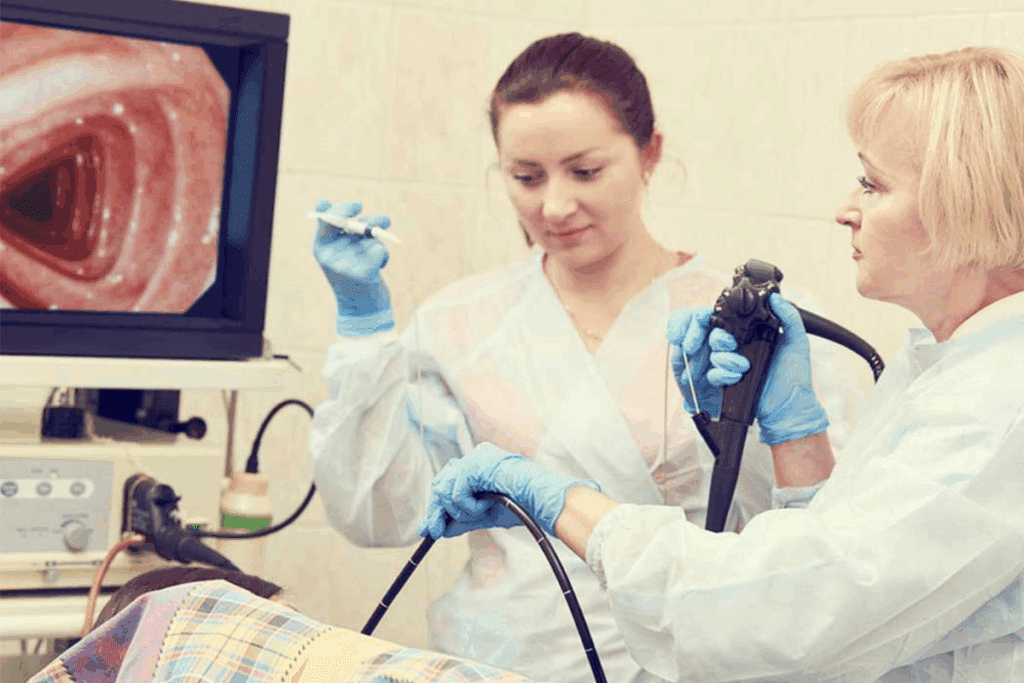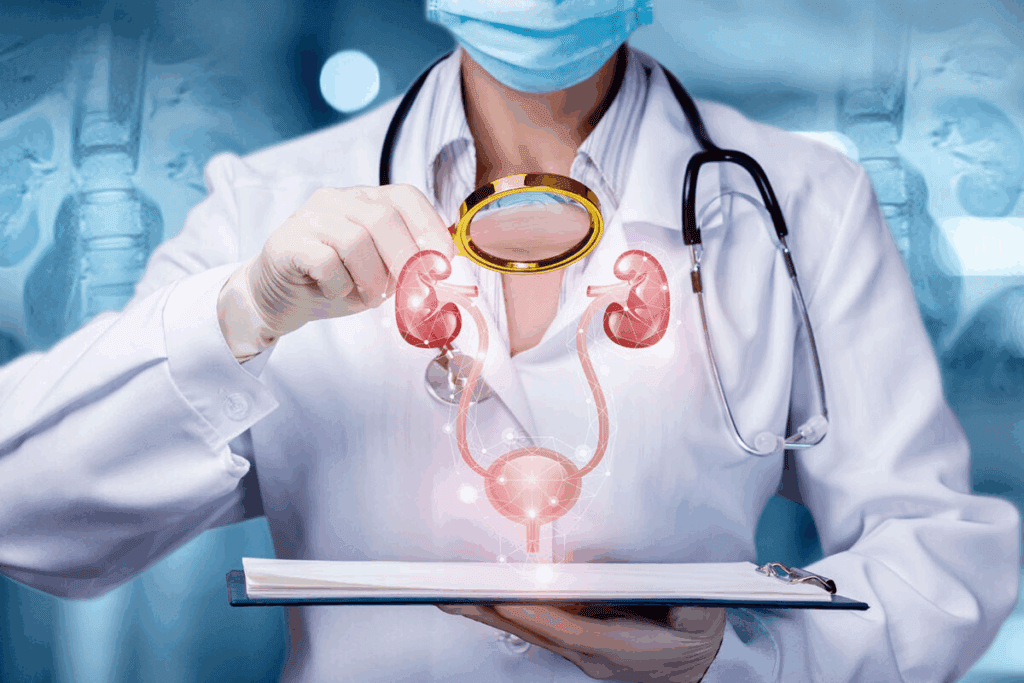
Recovering from a cystoscopy is quick for most people. A standard cystoscopy takes 5-10 minutes. If more procedures are done, like biopsies, it might take longer. But overall, recovery is short.
At Liv Hospital, we make sure patients get all the info they need before and after cystoscopy. Most people feel better in 1-2 days. They might feel a little burning when they pee or see a bit of blood how long does it take to recover from a cystoscopy.
Key Takeaways
- Most patients recover within 1-2 days after the procedure.
- Temporary side effects may include mild burning during urination or slight blood in urine.
- Liv Hospital provides complete care and education for patients undergoing cystoscopy.
- Recovery time may vary depending on additional procedures performed during cystoscopy.
- Patients can expect a relatively quick return to normal activities.
Understanding Cystoscopy: A Visual Examination of the Bladder

A cystoscopy is a way to look inside the bladder. It uses a thin, lighted tool called a cystoscope. This tool goes through the urethra. It helps doctors see inside the bladder and urethra to find problems.
What Is a Cystoscopy?
Cystoscopy lets doctors see inside the bladder. They use a cystoscope to find things like stones or tumors. It helps them see if there’s any inflammation.
Why Cystoscopies Are Performed
Cystoscopies are done for many reasons. They help find the cause of urinary symptoms. Doctors also use them to check for bladder stones or tumors. It helps them decide how to treat the problem.
Types of Cystoscopes: Flexible vs. Rigid
There are two kinds of cystoscopes: flexible and rigid. Flexible cystoscopes are more comfortable. They let doctors see more of the bladder. Rigid cystoscopes give a clearer view. They are used when doctors need to do more during the exam.
| Characteristics | Flexible Cystoscope | Rigid Cystoscope |
| Comfort Level | Higher | Lower |
| View Clarity | Good | Excellent |
| Procedure Flexibility | Limited additional procedures | Allows for additional procedures |
The Cystoscopy Procedure: What to Expect

Knowing what to expect during a cystoscopy can help reduce anxiety. We’ll walk you through preparation, the procedure, and how long it takes.
Before the Procedure: Preparation Steps
Before a cystoscopy, you’ll arrive early to fill out paperwork and prepare. Preparation may include:
- Reviewing your medical history to ensure the procedure is safe.
- Discussing any allergies or medications you’re currently taking.
- Signing a consent form after understanding the procedure’s risks and benefits.
It’s also advisable to have someone with you after the procedure, if you’re having sedation.
During the Procedure: Step-by-Step
Here’s what happens during a cystoscopy:
- The patient is positioned on an examination table, usually on their back with legs raised.
- The genital area is cleaned, and a local anesthetic may be applied to reduce discomfort.
- A cystoscope is gently inserted into the urethra and guided into the bladder.
- The doctor examines the bladder and urethra, potentially taking biopsies or removing polyps.
- The cystoscope is carefully removed after the examination is complete.
How Long Does a Cystoscopy Take to Complete?
The cystoscopy procedure usually takes 5-10 minutes. But, if there are extra steps or prep, it might take 30-60 minutes. We know you’re wondering how long does a cystoscopy take, and we’re here to help.
In short, the cystoscopy itself is quick. But, you’ll spend more time at the clinic for prep and recovery. Plan ahead for a smoother experience.
Immediate Post-Procedure Experience
The time right after a cystoscopy is key for your safety and comfort. We take you to a recovery room where our team watches over you closely.
Recovery Room Monitoring
In the recovery room, we check your vital signs and look for any complications. This is vital to make sure you’re okay and to fix any problems fast. Our team is ready for any situation that might come up.
Initial Sensations After Cystoscopy
Right after a cystoscopy, you might feel some discomfort or need to urinate a lot. These feelings usually go away soon. We know it can be scary, but these symptoms don’t last long.
Common initial sensations include:
- Mild discomfort or pain
- Urinary urgency or frequency
- Minor bleeding or spotting
Discharge Instructions
Before you go home, we give you detailed instructions. These cover how to handle any discomfort, watch for complications, and what to do next. It’s important to follow these steps to recover smoothly.
Your discharge instructions may include advice on:
- Medication to manage discomfort or pain
- Monitoring for signs of infection or other complications
- Resuming normal activities
- Follow-up appointments
By following our instructions and knowing what to expect, you can have a comfortable recovery from your cystoscopy.
How Long Does It Take to Recover from a Cystoscopy? Timeline Overview
Knowing how long it takes to get better after a cystoscopy is key. It helps patients know what to expect and spot any problems early.
First 24 Hours After Procedure
The first 24 hours are very important. Most people can go back to their usual activities in a few days. But, it’s vital to follow certain rules during this time.
- Rest and avoid hard activities.
- Drink lots of water to stay hydrated.
- Watch for any big problems, like a lot of bleeding or really bad pain.
Days 2-3 Recovery Milestones
By days 2-3, many people start to feel much better. But, some might feel a bit off.
Common feelings during this time include:
- A little discomfort or burning when you pee.
- Needing to pee a lot.
- Seeing a bit of blood in your pee.
Complete Recovery Expectations
How long it takes to fully recover can differ. But, most people can get back to their normal life in about a week.
| Recovery Stage | Typical Symptoms | Expected Duration |
| First 24 Hours | Discomfort, frequent urination, possible blood in urine | 1 day |
| Days 2-3 | Mild stinging, frequency, minor bleeding | 2-3 days |
| Complete Recovery | Return to normal activities, minimal to no symptoms | 1-2 weeks |
While most people get better in 1-2 days, some might feel off for longer. The time it takes to recover can change based on many factors and the type of cystoscopy done.
Common Side Effects During Cystoscopy Recovery
Knowing what to expect after a cystoscopy can make recovery easier. Patients often face symptoms that affect their urine and comfort.
Urinary Symptoms: Burning, Frequency, and Blood
Urinary symptoms are common after a cystoscopy. These include burning during urination, increased frequency, and blood in urine. These symptoms are usually mild and go away in a few days.
Some patients feel a burning sensation when they pee. This is because the cystoscope touches the urethra. They might also pee more often. Seeing a bit of blood in their urine is normal but should be watched.
Pain and Discomfort Levels
Pain levels after a cystoscopy vary. Some feel little discomfort, while others feel more. The pain depends on the cystoscope type and how sensitive you are.
Most pain can be managed with over-the-counter meds. It usually goes away in a few days. Always follow your doctor’s advice on pain relief.
Duration of Side Effects
Side effects from a cystoscopy don’t last long. Symptoms usually get better in 2 to 3 days. But, how long it takes can depend on your health and the procedure details.
It’s important to keep an eye on your symptoms. If they don’t go away or get worse, talk to your doctor. Knowing what to expect helps you recover better and get the right care.
Recovery Differences Based on Cystoscopy Type
Recovery from a cystoscopy can vary a lot, depending on the type of cystoscope used. The type of cystoscopy done affects how you feel after it. Each type has its own recovery path.
Flexible Cystoscopy Recovery
Flexible cystoscopy is often quicker to recover from because it’s less invasive. Most patients can go back to normal activities within 24 hours. We tell patients to watch out for any mild side effects like needing to pee a lot or feeling a bit uncomfortable.
“The flexibility of the cystoscope allows for a more comfortable procedure, which in turn can lead to a faster recovery.” – Medical Expert, Urologist
Rigid Cystoscopy Recovery
Rigid cystoscopy is more invasive, so it might take a bit longer to get better. It can take 48 to 72 hours for some patients to fully recover. It’s key to follow the post-procedure instructions closely to avoid complications and ensure a smooth recovery.
During this time, you might feel more side effects, like burning when you pee or seeing blood in it. These symptoms usually go away in a few days.
Cystourethroscopy Recovery Time
Cystourethroscopy, which looks at both the bladder and urethra, can have a recovery time similar to both flexible and rigid cystoscopy. Most patients can get back to normal in a few days. We advise following specific care instructions after the procedure to help with recovery.
Knowing how different cystoscopy types affect recovery can help you prepare better for your procedure and recovery.
Female Cystoscopy: Special Recovery Considerations
Women’s recovery after a cystoscopy can be influenced by various elements, including the type of anesthesia used. Understanding these factors can help women prepare for their procedure and post-procedure care.
How Long Does a Cystoscopy Take for Women?
The duration of a cystoscopy procedure for women is generally similar to that for men, typically ranging from 15 to 30 minutes. The overall recovery time can vary based on individual factors and the type of anesthesia administered.
Local anesthesia may allow for quicker recovery, as it numbs the area and wears off relatively quickly. On the other hand, general anesthesia may require more time to recover from, as it induces a state of unconsciousness.
Recovery Based on Anesthesia Type
The type of anesthesia used during a cystoscopy can significantly impact the recovery process. Women who receive local anesthesia may resume their normal activities sooner compared to those who receive general anesthesia.
- Local Anesthesia: Recovery is typically faster, with most women able to return home shortly after the procedure.
- General Anesthesia: Recovery may take longer, as the effects of the anesthesia can last for several hours.
Female-Specific Recovery Concerns
Women may experience specific concerns during the recovery period, such as urinary symptoms or discomfort. It’s essential to follow post-procedure instructions provided by healthcare professionals to minimize possible complications.
Some common concerns include:
- Urinary frequency or burning sensation
- Mild discomfort or pain
- Spotting or light bleeding
Monitoring these symptoms and reporting any unusual changes to a healthcare provider can ensure a smooth recovery.
Returning to Normal Activities After Cystoscopy
Knowing when it’s okay to go back to normal after a cystoscopy is key. Usually, people can start doing normal things in 1-2 days. But, always listen to your doctor’s specific advice for the best recovery.
Work and Daily Routine Resumption
Most people can go back to work in a day or two after a cystoscopy. The exact time depends on the type of cystoscopy and your health. Desk jobs might be easier to get back to than jobs that are very physical.
- Desk jobs: Usually, you can go back to desk work in 24 hours.
- Physical labor: It’s best to wait 48 hours before doing heavy physical work.
Physical Activity Restrictions
Doctors often tell patients to avoid heavy lifting and hard exercise for a while. This helps prevent problems and lets you heal right.
- Avoid hard activities for 24-48 hours.
- Start normal exercise again when your doctor says it’s okay.
Also, pay attention to how your body feels. If you’re in pain or uncomfortable, stop and talk to your doctor.
Driving and Travel Considerations
Think carefully about driving and traveling after a cystoscopy. Usually, you shouldn’t drive yourself home if you had sedation.
- Driving: Don’t drive for 24 hours if you had sedation.
- Travel: Wait 48 hours for long trips to make sure you’re fully recovered.
Having someone with you on trips is a good idea, too, if you’re going far.
By following these tips and your doctor’s advice, you can safely and smoothly get back to your usual activities after a cystoscopy.
When to Seek Medical Help During Recovery
After a cystoscopy, it’s key to watch your recovery closely. Look out for signs that mean you need to see a doctor right away. Most people get better without big problems, but knowing about possible issues helps you act fast if needed.
Warning Signs of Complications
Some symptoms can show you’re facing complications after a cystoscopy. If you notice any of these, get medical help quickly:
- Severe pain that doesn’t get better with the pain meds you’re given
- Heavy bleeding or clots in your urine
- Difficulty urinating or not being able to urinate at all
- Severe abdominal pain
- Fever or chills
Infection Symptoms to Watch For
Infections are rare but can happen after a cystoscopy. Look out for these infection signs:
- High fever (over 101°F)
- Chills or shaking
- Burning sensation while urinating that doesn’t get better or gets worse
- Strong-smelling or cloudy urine
- Pain or tenderness in the lower abdomen
If you see any of these, reach out to your healthcare provider right away.
Persistent or Worsening Symptoms
Some discomfort is normal after a cystoscopy, but it should get better with time. If your symptoms don’t get better or get worse, you need to see a doctor. This includes:
- Continued or increasing pain
- Prolonged difficulty urinating
- Blood in the urine that doesn’t go away
Your healthcare provider can check you out and guide you on what to do next.
Knowing about these possible problems and when to get help can really help you recover well after your cystoscopy.
Conclusion: What to Expect on Your Cystoscopy Recovery Journey
Recovering from a cystoscopy is usually easy. Most people feel a bit sore but get better in a few days. Knowing what to expect can make you feel more at ease and help you get back to your routine quickly.
The time it takes to recover can differ from person to person. But, most folks can get back to their usual activities in just a few days. Understanding what to expect can make your recovery journey smoother.
It’s true that everyone’s experience is different. But, knowing what to expect can really help. It can make you feel less anxious and help you get back to your daily life faster. We’re here to support you every step of the way.
FAQ
What is a cystoscopy?
A cystoscopy is a medical procedure. It lets healthcare providers see inside the bladder and urethra. They use a cystoscope for this.
How long does a cystoscopy take to complete?
A cystoscopy can take anywhere from 5 to 30 minutes. This depends on the type of procedure and if more steps are needed.
How long does it take to recover from a cystoscopy?
Recovery from a cystoscopy usually takes a few days. Most side effects go away within 24 to 48 hours.
What are the common side effects during cystoscopy recovery?
Common side effects include burning, frequent urination, and blood in the urine. Some may also feel discomfort or pain. These are usually mild and short-lived.
How long do urinary symptoms last after a cystoscopy?
Urinary symptoms usually last a few days. Most people see improvement within 24 to 48 hours. But, in some cases, symptoms can last up to a week.
Can I return to work after a cystoscopy?
Most people can go back to work within a day or two. This depends on how quickly you recover and the type of work you do.
Are there any restrictions on physical activity after a cystoscopy?
Yes, you should avoid strenuous activities, heavy lifting, and bending for a few days. This helps prevent complications.
How long does it take to recover from a flexible cystoscopy?
Recovery from a flexible cystoscopy is faster. Most people can resume normal activities within a day.
What are the warning signs of complications after a cystoscopy?
Look out for severe pain, heavy bleeding, fever, chills, or trouble urinating. If you experience any of these, seek medical help right away.
How long does a cystoscopy take for women?
The time for a cystoscopy in women is similar to men. It usually takes from 5 to 30 minutes, depending on the procedure’s complexity.
Are there any female-specific recovery concerns after a cystoscopy?
Women may have specific concerns. These can include the type of anesthesia used and individual factors. It’s best to discuss these with your healthcare provider.
Can I drive after a cystoscopy?
It’s not recommended to drive yourself home after a cystoscopy, if you’ve had sedation. Make sure to have someone with you.
What is the recovery time for a cystourethroscopy?
Recovery from a cystourethroscopy is similar to a cystoscopy. Most people recover within a few days.
References
Government Health Resource. (2025). How Long Does It Take to Recover from. Retrieved from https://www2.hse.ie/conditions/cystoscopy/recovery/




































